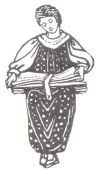Language
Ulster-Scots is a sister language to Scots, which itself was brought into what we now call Scotland by settlers from Continental Europe in about the 6th century A.D. It reached the island of Ireland  when large numbers of Scots began to come to the northern half of the Ards Peninsula from 1606, to settle on lands granted to Montgomery and Hamilton, two Ayrshire men. From there, the settlers spread out in that horseshoe pattern that was centuries later identified by Professor Robert Gregg in his early pioneering studies of Ulster-Scots.
when large numbers of Scots began to come to the northern half of the Ards Peninsula from 1606, to settle on lands granted to Montgomery and Hamilton, two Ayrshire men. From there, the settlers spread out in that horseshoe pattern that was centuries later identified by Professor Robert Gregg in his early pioneering studies of Ulster-Scots.
We find the first instance of the term ‘Ulster Scots’ (used to define the people) in a source dated 8 October 1640 (‘The Life and Original Correspondence of Sir George Radcliffe, Knt.’, cited in James Seaton Reid’s History of the Presbyterian Church in Ireland).
There was much more traffic between Ulster and Scotland during the 17th century and after than we realise. However, the language developed in contact with what we now call Northern Hiberno-English (originating with the English settlers) and with the Irish of the indigenous population for the next three hundred years. It was the tongue of the pioneers who founded America, and it is ‘their ain mither tongue’ for thousands of Ulster folk.
In the twentieth century and even today, Ulster-Scots is a heavily stigmatised language. The rich vocabulary of earlier days has been eroded under the influence of BBC English. Often it is thought of as a dialect of English, a view Professor Gregg described as ‘ridiculous’, or even as a kind of debased English, another misinformed opinion. However, people are slowly learning to be proud of their linguistic heritage. In March 2001, the United Kingdom Government ratified the European Charter for Regional or Minority Languages – in the case of Ulster-Scots, giving it Stage 2 status. The Society is throwing its weight behind moves to achieve Stage 3 status for the language, which, importantly, gives it a place in the education system.
